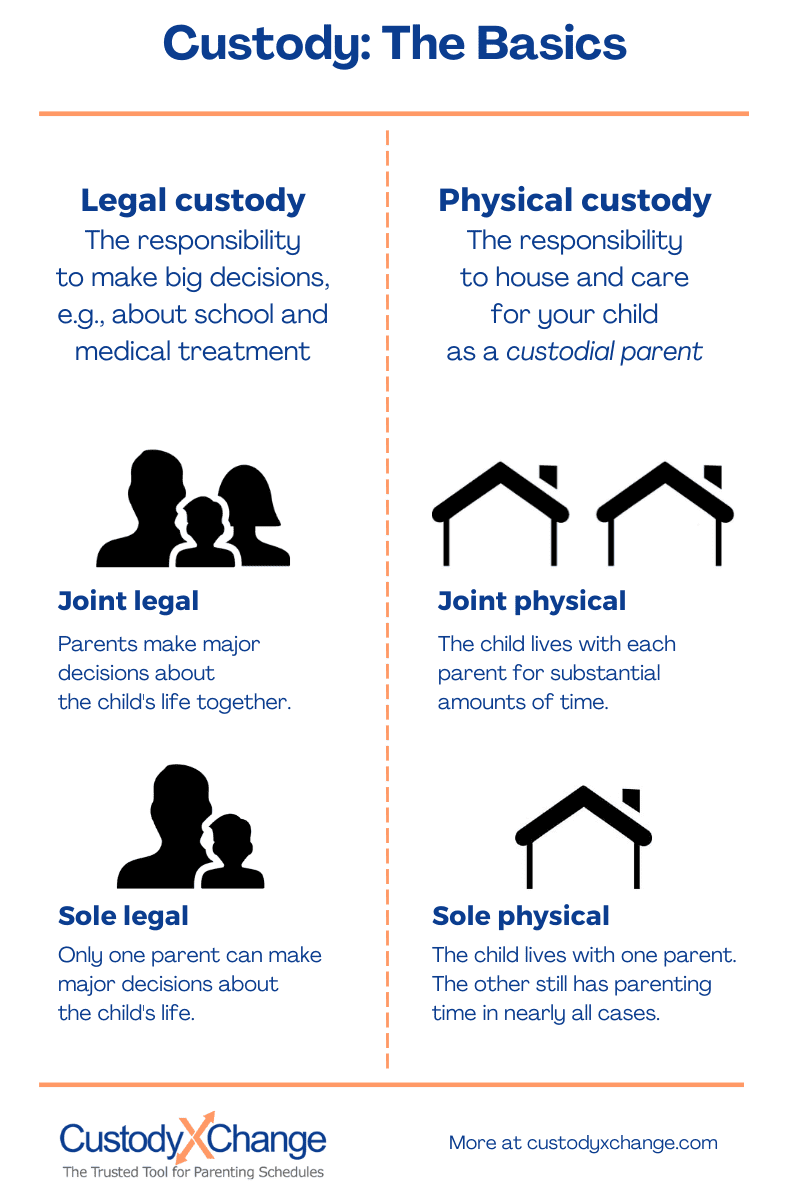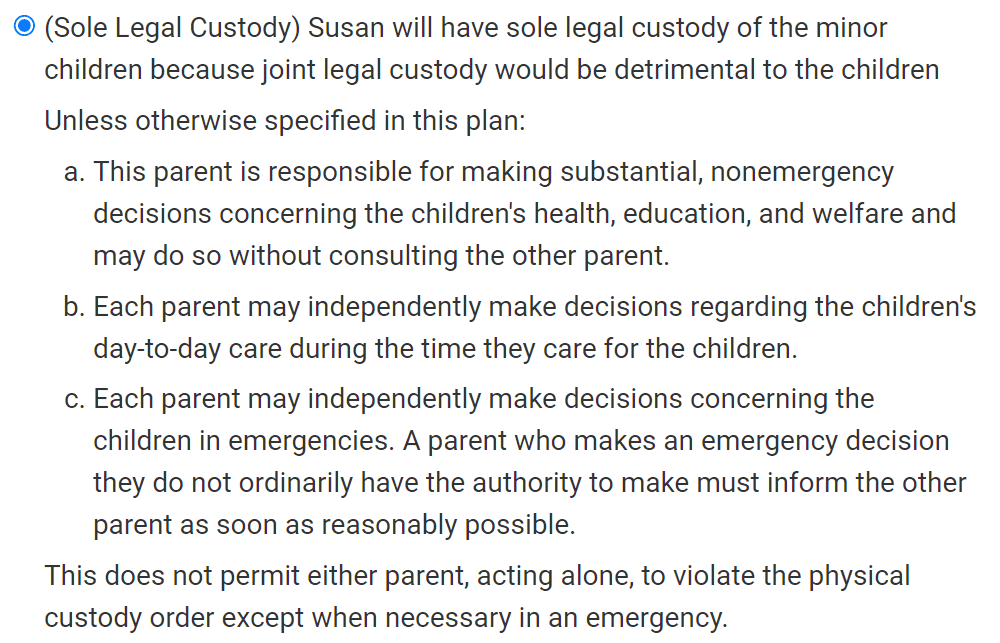Sole Legal Custody Defined
The term custody refers to the legal and physical custody of a child. Legal custody is the authority to make decisions for and about a child.
Sole legal custody (also called sole parental responsibility) is when one parent has full responsibility to make major decisions for the child. The other parent doesn't have a say, but often has visitation rights and the responsibility to pay child support.
The alternative to sole legal custody is joint legal custody, where parents share decision-making.
You need to specify in your parenting plan what kind of legal custody your family will use. This determines who makes decisions about your children's education, medical care, religion, extracurricular activities and more.

You can customize this to fit your situation with Custody X Change.
Basics of sole legal custody
Usually, sole legal custody is awarded alongside sole physical custody.
Sole legal custody is best for situations where one parent is unavailable or unable to make decisions on short notice. It's often necessary in cases with parental instability, substance abuse, child abuse, neglect, abandonment or similar situations.
It is becoming less common because many state guidelines set joint legal custody as the default. In these states, sole legal custody is awarded only if joint legal custody would be harmful to the child.

You can customize this to fit your situation with Custody X Change.
Factors considered when granting sole legal custody
Many courts presume a child should be raised by both parents, unless evidence shows otherwise.
Factors the court considers to determine if sole legal custody is right for each situation include:
- If sole legal custody would benefit the child
- If it's practical for each parent to make decisions for the child
- If a parent is unfit or could pose a danger to the child
- If one parent is seeking sole legal custody to exclude the other from the child's life
While these factors are important in all legal custody disputes, laws and practices vary from state to state. Be sure to consult your state's custody guidelines.
Advantages of sole legal custody
Sometimes parents simply cannot work together. In these cases, sole legal custody may be the best option.
When one parent is responsible for all major decisions, parents don't need to communicate as much. This lowers the possibility of conflict between them.
Another benefit of sole legal custody is its consistency, which children thrive on. For example, sole legal custody eliminates the confusion kids could face if their parents made child-rearing decisions based on conflicting belief systems.
In addition, removing decision-making rights from a parent who's violent or who abuses substances can help protect a child. The parent will usually still have supervised visitation.
Drawbacks of sole legal custody
A court order granting sole legal custody to one parent can be disheartening for the other if he or she is invested in helping raise the children.
For the parent excluded from major decision-making, resentment may build up. Over time, the children may view him or her as less important than the other parent because of the limited involvement in their lives. This can be a source of conflict within the family.
Another drawback: When a parent makes decisions alone, they don't have the benefit of bouncing ideas off the other parent. It's in their discretion whether to seek input from the other parent.
When sole legal custody works best
Sole legal custody often appeals to parents because of the simplicity of making decisions without having to consult anyone. However, it is not intended as a workaround for parents who have difficulty compromising.
It is meant for situations in which one parent is clearly more likely to make sound decisions. If both parents are available and fit to make reasonable decisions, the court is unlikely to grant sole legal custody.
Situations where sole legal custody works well include:
- When one parent fails to maintain contact with the children and is essentially absent from their lives
- When it's impractical for parents to make decisions together quickly because they live in different time zones
- When a parent is unfit to make decisions for their child due to mental health issues, substance abuse or a history of neglect or abuse
Without sufficient evidence that involving the other parent in decision-making could harm your child, your chances of earning sole legal custody are slim.
Designating sole legal custody in your parenting plan
Creating a parenting plan can feel overwhelming.
Use technology to take guesswork out of the equation. The Custody X Change app walks you through each step of creating a comprehensive parenting plan.
Designating sole legal custody in your plan is easy. In the app, click the "parenting plan" tab. More than 25 categories of parenting provisions will appear.

You can customize this to fit your situation with Custody X Change.
Click the second category: legal custody. Then, select the button that gives sole legal custody to the right parent.
Now you're on your way to a professional-quality document for managing your child's custody.

You can customize this to fit your situation with Custody X Change.
